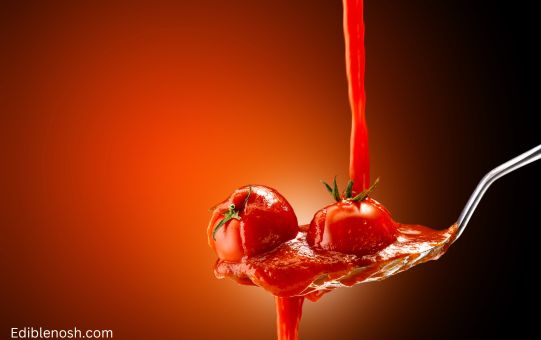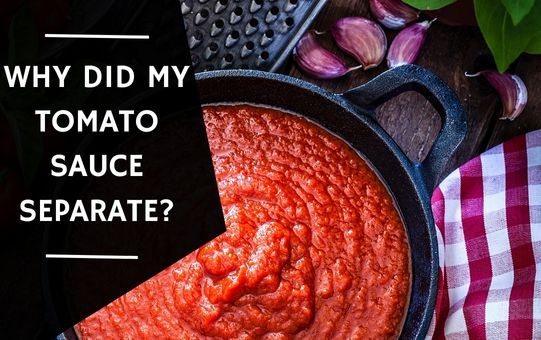Did you ever wonder Why Did My Tomato Sauce Separate when you boil it? If you didn’t ask yourself this question before, you should now!
Why did my tomato sauce separate? Tomato sauce may separate due to overcooking, not enough acid, or insufficient emulsifiers. To prevent separation, use enough acid, add an emulsifier, and cook the sauce for the right amount of time.
To fix the separated sauce, try adding an emulsifier, a thickening agent, or blending the sauce. If the sauce has been contaminated or left out for an extended period of time, it may need to be discarded.
Contents
- Why Did My Tomato Sauce Separate matter?
- What Causes Tomato Sauce to Separate?
- How Can I Prevent Tomato Sauce from Separating?
- What Can I Do If My Tomato Sauce Separates?
- Can I Salvage Separated Tomato Sauce?
- How to Fix Separated Tomato Sauce?
- why is my spaghetti sauce watery?
- Conclusion
- FAQs | Why Did My Tomato Sauce Separate?
Why Did My Tomato Sauce Separate matter?
If tomato sauce separates, it means that the ingredients have separated into layers, and the sauce has lost its smooth texture. There can be several reasons why this happens. One common reason is that the sauce has been cooked at too high of a temperature or for too long, causing the oils and fats in the sauce to separate. To avoid this, it is essential to cook the sauce over low to medium heat and stir it regularly.
Another reason why tomato sauce may separate is the use of ingredients that are not well emulsified. For example, if you add oil or butter to the sauce and it is not mixed thoroughly, it can separate from the other ingredients in the sauce.
Similarly, if you add dairy products such as cream or cheese, they can curdle and cause the sauce to separate. To avoid this, it is essential to mix all ingredients well before adding them to the sauce and to avoid adding dairy products at high temperatures.
What Causes Tomato Sauce to Separate?
There are a few different factors that can cause tomato sauce to separate, including:
- Overcooking: If you cook your tomato sauce for too long, the liquids can evaporate, leaving behind a thicker, more concentrated sauce. This can cause the sauce to separate as the solids and liquids are no longer evenly distributed.
- Not enough acid: Tomatoes are naturally acidic, which helps to balance out their sweetness and give tomato sauce its tangy flavor. However, if you’re using low-acid tomatoes or not adding enough vinegar or lemon juice to your sauce, the pH balance can be thrown off, causing the sauce to separate.
- Not enough emulsifiers: An emulsifier is a substance that helps to bind together two liquids that normally don’t mix, such as oil and water. Tomato sauce contains both water and oil, and if there isn’t enough emulsification happening, the sauce can separate.
Read Also: Why Cook Tomato Sauce Long?
How Can I Prevent Tomato Sauce from Separating?
Now that we know what causes tomato sauce to separate, let’s talk about how we can prevent it from happening. Here are a few tips:
- Cook your sauce for the right amount of time: The key to preventing your tomato sauce from separating is to cook it for the right amount of time. This will depend on the recipe you’re using, but as a general rule, you should aim to cook your sauce until it’s thickened and the flavors have melded together.
- Use enough acid: As mentioned earlier, tomatoes are naturally acidic, but if you’re using low-acid varieties or not adding enough vinegar or lemon juice, your sauce may not have enough acid to balance out the flavors. To prevent this, be sure to use enough acid in your sauce.
- Use an emulsifying agent: If you’re worried about your sauce separating, you can use an emulsifying agent to help bind the liquids together. Some common emulsifiers for tomato sauce include tomato paste, which contains a lot of natural pectins, and a small amount of butter or olive oil.

What Can I Do If My Tomato Sauce Separates?
If your sauce has separated and you want to try to fix it, here are a few things you can try:
- Add an emulsifying agent: As mentioned above, tomato paste and a small amount of butter or olive oil can help to bind together the liquids and solids in your sauce. If your sauce has separated, try adding a small amount of one of these emulsifiers and stirring well.
- Add a thickening agent: If your sauce is too watery, you can try adding a thickening agent to help bring it back together. Cornstarch or flour are both good options, but be sure to mix them with a small amount of cold water before adding them to the sauce to prevent clumps from forming.
- Blend the sauce: If your sauce has separated into large chunks of solids and a watery liquid, you may be able to bring it back together by blending it. Use an immersion blender or transfer the sauce to a blender or food processor and blend until smooth.
- Cook the sauce longer: If your sauce is still too watery even after adding an emulsifying agent or thickening agent, you may need to cook it for longer to allow some of the excess liquid to evaporate. Be sure to stir the sauce regularly to prevent it from sticking to the bottom of the pot.
Can I Salvage Separated Tomato Sauce?
In most cases, it’s possible to salvage separated tomato sauce by following the tips outlined above.
However, there may be some instances where the sauce is simply too far gone to be saved.
If your sauce has been sitting out for an extended period of time or has become contaminated with bacteria, it’s best to throw it out and start fresh.
How to Fix Separated Tomato Sauce?
To fix separated tomato sauce, try adding an emulsifying agent like tomato paste or a small amount of butter or olive oil to help bind the liquids and solids together.
You can also try adding a thickening agent like cornstarch or flour, mixed with a small amount of cold water to prevent clumps.
If the sauce has separated into large chunks of solids and a watery liquid, you can try blending it with an immersion blender or in a blender or food processor until smooth.
If the sauce is still too watery even after adding an emulsifying agent or thickening agent, you may need to cook it for longer to allow some of the excess liquid to evaporate.
Be sure to stir the sauce regularly to prevent it from sticking to the bottom of the pot.
Read Also: Why Do You Have To Refrigerate Tomato Sauce?
why is my spaghetti sauce watery?
Your spaghetti sauce may be watery due to several reasons:
Excess liquid: If you added too much water, broth, or other liquid ingredients to the sauce, it can make it watery.
Overcooking: Prolonged cooking can cause the sauce to reduce and thicken, but if it’s cooked for too long, it may evaporate too much liquid and become watery.
Lack of thickening agents: If the sauce doesn’t contain enough ingredients to thicken it, such as tomato paste, cheese, or a roux (a mixture of flour and fat), it may remain watery.
Watery tomatoes: The water content of tomatoes can vary, and some varieties may be more watery, affecting the sauce’s consistency.
To fix a watery spaghetti sauce:
Simmer and reduce: Cook the sauce over low heat to allow excess liquid to evaporate and the sauce to thicken.
Add thickening agents: Incorporate ingredients like tomato paste, grated cheese, or a roux to help thicken the sauce.
Strain the sauce: If there’s an excessive amount of liquid, you can strain the sauce to remove some of the extra liquid.
Cornstarch or arrowroot: Mix a small amount of cornstarch or arrowroot with water, then stir it into the sauce to thicken it.
Cook uncovered: Leave the saucepan uncovered during simmering to allow more evaporation and thickening.
Remember to taste the sauce after making adjustments and adjust the seasoning as needed.
Conclusion
Separated tomato sauce can be a frustrating problem, but it’s also one that’s easily avoidable with a little bit of knowledge. By cooking your sauce for the right amount of time, using enough acid, and adding an emulsifying agent, you can prevent your sauce from separating.
And if it does happen, there are a few simple fixes you can try to bring it back together. With these tips in mind, you’ll be well on your way to making perfectly smooth and delicious tomato sauce every time.
FAQs | Why Did My Tomato Sauce Separate?
Here are a few FAQs related to separate tomato sauce:
What Causes Tomato Sauce To Separate?
There are several factors that can cause tomato sauce to separate, including overcooking, not enough acid, and not enough emulsifiers.
How can I prevent tomato sauce from separating?
To prevent tomato sauce from separating, cook it for the right amount of time, use enough acid, and add an emulsifying agent like tomato paste or a small amount of butter or olive oil.
why does my pasta sauce separate?
Pasta sauce can separate due to factors such as overheating, using low-quality ingredients, or the presence of high acidity. Improper emulsification or quick reheating can also cause the sauce to separate.
why does my spaghetti sauce separate?
Spaghetti sauce can separate due to various reasons, such as overcooking, using low-quality ingredients, or adding acidic ingredients like vinegar or lemon juice. The separation can also occur if the sauce is not properly emulsified or if it is reheated too quickly.
Is it safe to eat separated tomato sauce?
If the tomato sauce separating and is still within the recommended storage time, it should be safe to eat.
However, if the sauce has been left out for an extended period of time or has become contaminated with bacteria, it’s best to discard it to prevent the risk of food poisoning.
Does tomato sauce oil separates?
Yes, it is possible for tomato sauce to separate, especially if it contains oil. The oil can separate from the sauce due to factors such as improper emulsification, overheating, or if the sauce is stored for an extended period of time.
why does my homemade tomato sauce separate?
Homemade tomato sauce may separate due to oil and water-based components not fully emulsifying; use emulsifiers like cheese, butter, or cream to help stabilize it.
How to fix separate sauce?
To fix the separated sauce, gently stir it and add emulsifiers like egg yolk or cream if needed.
what is the liquid(s) in tomato sauce?
The liquid(s) in tomato sauce typically include water and tomato juice or tomato puree. Additionally, some recipes may call for the addition of broth, wine, or other liquids to enhance the flavor and consistency of the sauce.

